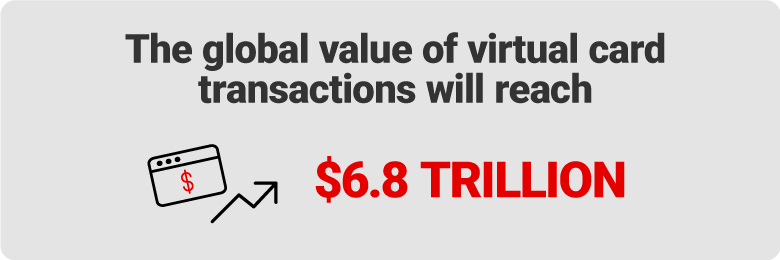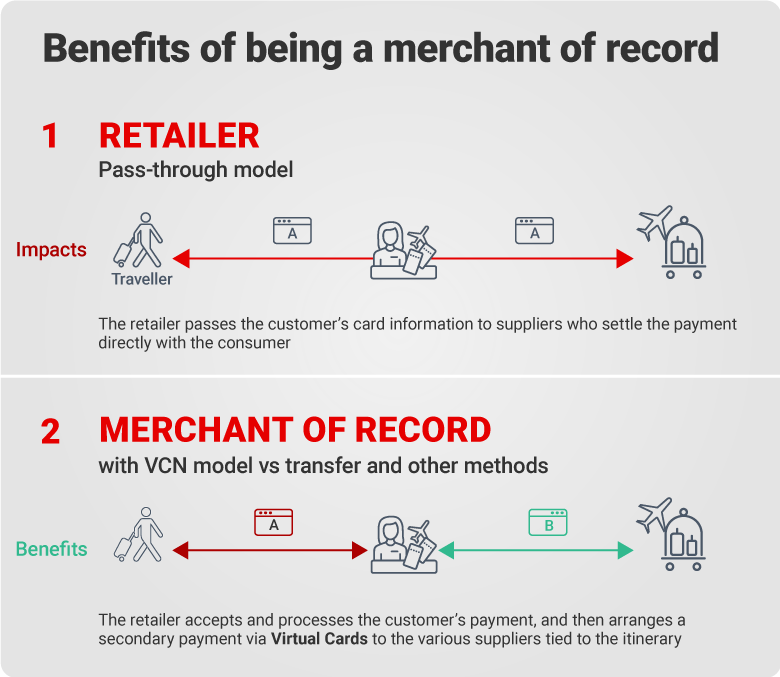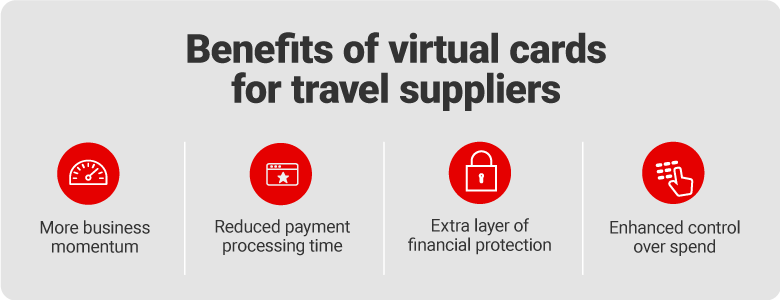[ad_1]
In just a decade, virtual cards have evolved from a tech
novelty to a powerhouse for travel suppliers. As commercially minded agencies
seek seamless, automated payments, the surge in virtual card transactions is
only set to grow.
The global value of
virtual card transactions will reach $6.8 trillion in 2026, from $1.9 trillion
in 2021. Travel merchants, including airlines, travel advisors, online travel
agencies, tour operators, hotels and car rental companies, are in line to receive
powerful benefits that change how they do business.
Travel agents are one of the most critical stakeholders in
travel. Often, they own the relationship with the traveler who relies on them
for recommendations, convenience and post-booking support. But in managing the
travel supply chain – from airlines to hotels to restaurants to spas – they are
also the guardians of the traveler’s experience. Agencies stand to benefit from virtual cards
that improve travel on the ground and business operations in the office.
What is a virtual card?
In the realm of B2B transactions, virtual card numbers
function as a payment option typically issued for the purpose of paying
a specific amount in a chosen currency to a designated merchant. Every virtual
card is equipped with a unique 16-digit virtual card number a three- or four-digit CVV
number and an expiration date.
Virtual payments allow businesses to issue a unique virtual
card number that stores all transaction data, such as payment information
and purchase details. Because virtual card numbers are digital, travel
intermediaries can organize and manage them in granular ways, unlocking new
capabilities.
When travel buyers,
such as travel agencies, use virtual cards to pay travel suppliers in a
business-to-business transaction, virtual payment solutions allow travel buyers
to obtain virtual cards from multiple issuers through a single integration.
Pass-through vs. merchant of record models
Virtual cards have become a critical conduit for travel providers
as they transition from transaction processors to experience purveyors. Under
the more traditional pass-through model, they act as payment intermediaries,
relaying customer payment information directly to the suppliers involved in the
travel itinerary. In this scenario, challenges can arise, including:
- Risk of fraud as the customer’s credit card details go to
multiple companies. - Risk to the agent’s reputation if the supplier mishandles
the transaction or delays a refund. - Potential delays in receiving agent commissions from
suppliers. - Misalignment between the payment methods available to
customers and those required by suppliers (especially in international travel). - Currency fluctuations that can cause travelers to pay more
than what the travel agency quotes. - Time-consuming payment reconciliation with multiple
suppliers. - Lack of insight into customer spending habits, preferences
and other data.
In contrast, many travel agencies are shifting to a merchant
of record model in which the agency collects all charges due from
clients, authorizes the transactions and pays the travel suppliers tied to the
booking. In this scenario, travel agents
can avert challenges through:
- Reduced risk of fraud as the agent retains the customer’s
credit card details. - Reduced risk to the agent’s reputation by controlling all
transactions and customer refunds. - No delays in receiving commissions from suppliers as the
agent can deduct its commission from supplier payments. - Fewer challenges with payment methods as agencies and
suppliers work out payment issues as part of establishing an ongoing business
relationship. - No impact from currency fluctuations since a virtual card
permits the travel agent to secure an exchange rate at the time of the booking. - Easier supplier payment reconciliation.
- Complete visibility so that travel buyers can easily track
their spending and generate automated reports, which leads to better
decision-making about how to allocate travel budgets.
One of the most significant benefits and unique features of
virtual cards for agencies is enhanced spending control. Travel buyers can
issue virtual cards for specific business-to-business use cases that they can
determine, including:
- Single transactions or specific purchases with a spending
limit. - Multiple transactions within a restricted time frame (for the
period of a business trip, for example). - Payments to one supplier or category of suppliers (for
instance, only hotels or only airlines). - Other payment scenarios with a combination of
restrictions.
Giving travel buyers greater control over payments under the merchant of record model opens the door to deeper relationships with suppliers,
enhanced cash flow, more revenue (travel agencies can offer customers lucrative
buy-now, pay-later plans) and higher
growth. According to Phocuswright and Mastercard, travel agents acting as merchants of record
in the United States posted a 43% compound annual growth rate from 2020 to 2022 – a growth rate more than two
times higher than that of the overall online travel agency market (20%
CAGR).
Benefits of virtual cards for travel suppliers
The
risk of fraud associated with virtual payments is much lower than with other
payment types, including physical credit cards, checks and wire transfers.
Physical card numbers are never revealed to suppliers, and virtual cards stop
functioning when they achieve their goals.
Virtual cards offer merchants an extra layer of financial
protection through guaranteed payments and refunds to travel service providers
on both sides of the transaction. In addition, airlines receive payment from
travel agencies at the time of the booking versus at two-week intervals under
Billing and Settlement Plans/Airlines Reporting Corporation (BSPs/ARC).
Virtual payment solutions reduce payment processing time and
effort across the supply chain. For example, virtual transaction reports
automatically match invoices and remittances, which merchants can import into
enterprise resource planning and accounting systems to facilitate
reconciliation.
Less payment processing time means merchants and suppliers
receive payments faster, reducing working capital costs and improving cash
flow. Virtual payments lessen the need for merchants and suppliers to track
down late payments or send out reminders and late notices and decrease the
number of accounting and reconciliation errors.
Virtual cards provide benefits and guarantees across the
travel supply chain – to travelers and merchants, such as travel agencies and
intermediaries, and suppliers, including airlines, hotels, car rental companies
and tour operators.
Why airlines should embrace virtual cards
Airlines, especially, benefit from virtual cards. Besides
being a fully secure and flexible payment alternative, virtual cards allow air
carriers to earn additional revenue from travel agencies that have exhausted
their BSP/ARC credit lines.
With higher acceptance rates – 99.1% for virtual cards
versus 85% for consumer cards, according to Mastercard – and less
fraud, airlines enjoy reduced processing costs and effort.
Virtual payments allow airlines and travel agencies to agree
on different pricing, levels and currencies (as not all relationships are
equal) on some wholesale travel programs from card schemes.
Payments are the connective tissue that binds the travel
ecosystem. And because momentum is moving toward efficient, secure and flexible
business-to-business payments, virtual payments – the operational, security and
competitive benefits of which outweigh the financial costs – are the next step
in the industry’s evolution.
As a leading software and technology provider to the travel
industry, Sabre knows how transformative it is for B2B travel businesses to be
able to consolidate complex processes in comprehensive, end-to-end solutions.
Sabre Virtual Payments, is a fully integrated, multi-channel solution that
allows agencies and travel bookers to select the combination of banks, credit
card schemes and funding solutions that deliver the most value to them and
their business.
*Sabre Virtual Payments product management director Nicolas
Ortiz contributed to this article.
Find out more
Speak to one of Sabre’s experts to discover how
you can accelerate your payments strategy today.
[ad_2]
Source link




